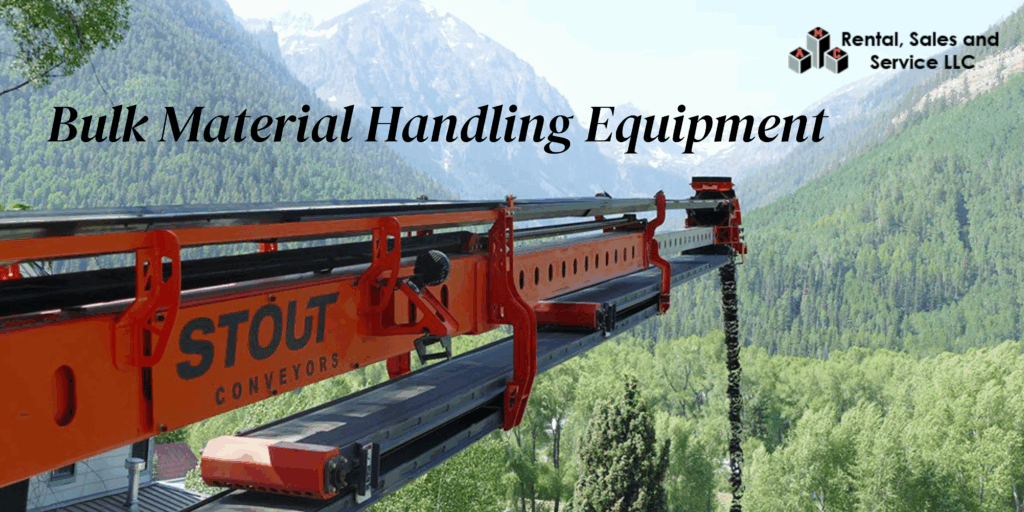In industries where high volumes of goods are moved daily, bulk material handling equipment plays a vital role. They are developed to handle, stock, and operate bulk substances effectively, including grains and minerals, coal, and construction rubbish. Manufacturing companies, agricultural companies, construction companies, and mining companies all require reliable equipment to increase efficiency as well as to keep people safe. Whether the need is to buy conveyor belt solutions or custom-designed handling systems, the right setup can significantly streamline operations.
Understanding Bulk Material Handling Equipment
Bulk material handling equipment technically means the mechanical devices that are specifically used for moving large quantities of dry and raw materials. Typical ones are belt conveyors, screw conveyors, bucket elevators, stackers, and reclaimers. All of the equipment is also designed to meet certain industry needs, as well as types of materials and flow.
These systems remove the manual operation and reduce the costs of operation, as well as speeding up the production. They equally play a pivotal role in keeping cleanliness and reducing loss of products, especially in industries that operate under handling sensitive and dangerous materials.
The Role of Conveyor Belt Construction in Material Flow
A conveyor belt is an important element of any material handling system. The structure and quality of conveyor belt construction determine how well materials are carried across long distances or inclined surfaces. The belts are mostly made in layers of rubber, PVC, nylon, or fabrics based on the item being carried.
Key aspects of efficient conveyor belt construction include:
- Tensile strength: It ensures that the belt can support heavy material without stretching or breaking.
- Resistance to impact: Warbles against falling type materials.
- Abrasion resistance: Increases the lifetime of the belt in a highly wear-resistant condition.
- Temperature tolerance: This is useful in moving both hot and cold substances.
Custom Solutions from Material Handling Conveyors Manufacturers
Every industry has unique needs, which is why working with experienced material handling conveyor manufacturers is important. These manufacturers not only provide standard equipment, but also provide custom fabrication according to particular conditions of workflow and environment.
A well-respected manufacturer will evaluate:
- Space constraints
- Weight and volume of loads
- Physical qualities of materials (sticky, dusty, abrasive, and L)
- Raise or lower the requirement
- System integration: Continuation of old systems
How to Buy Conveyor Belt Systems That Fit Operational Needs?
Deciding to purchase conveyor belt systems requires careful planning. There is more to purchasing the belt system than buying the belt; the belt system must fit into the existing systems and achieve the production line output objectives.
When looking to buy conveyor belt equipment, it is essential to consider:
- Material compatibility: The belt must be suitable for the bulk material that is being transported.
- Size and width: It mostly relies on the volume and product load size.
- Environment: The application and use may be in an outdoor, wet environment, or a process that is subject to chemicals.
- Drive mechanism: The drive mechanism can be electric motors, pneumatic, or manual, depending on the sources of their energy and the frequency of use.
AMC Conveyors and the Future of Bulk Material Handling
With a change in the industry, the need to come up with a smarter and more reliable handling system has increased. High-level control systems, automation, and energy-efficient designs are becoming the norm. Predictive maintenance and off-site management of operations are possible because of real-time monitoring using IoT-enabled equipment.
Upgrading to modern Material handling machinery enhances safety, improves accuracy in material tracking, and supports sustainability by reducing waste and energy consumption.
Final Thoughts
A high-performing bulk material handling equipment system is a cornerstone of efficient industrial operations. From selecting the proper conveyor belt construction to making informed decisions when choosing to buy conveyor belt systems, attention to detail leads to long-term benefits. Additionally, relying on trusted material handling conveyor manufacturers ensures that each component functions seamlessly within the larger system.
AMC Conveyors is a recognized name in the industry, offering tailored solutions and premium products that address both general and complex material handling challenges. In its high level of expertise and focus on quality, the brand still assists industries to be stronger, efficient, and safer.
FAQs
Q1: What industries commonly use Material handling machinery?
Mining, agriculture, manufacturing, food processing, and construction industries often depend on bulk material handling systems to control large amounts of materials conveniently.
Q2: How does conveyor belt construction impact performance?
The durability, flexibility, and loading capacity of the constructed conveyor belt are influenced by its construction. Good materials and overlays make them wear-resistant, tear-resistant, and environmentally friendly.
Q3: What are the benefits of working with material handling conveyor manufacturers?
Manufacturers provide custom-designed systems, technical expertise, and long-term support. This helps improve productivity, reduce maintenance needs, and ensure the system suits the facility’s layout and workload.
Q4: When should a business consider replacing a conveyor belt?
A belt should be replaced when there are signs of excessive wear, slippage, cracking, or when performance is consistently below standard. Routine inspections can help detect issues early.
Q5: Can conveyor systems be automated?
Yes, modern conveyor systems often include automation features such as sensors, variable speed controls, and remote monitoring, improving accuracy and operational efficiency.

